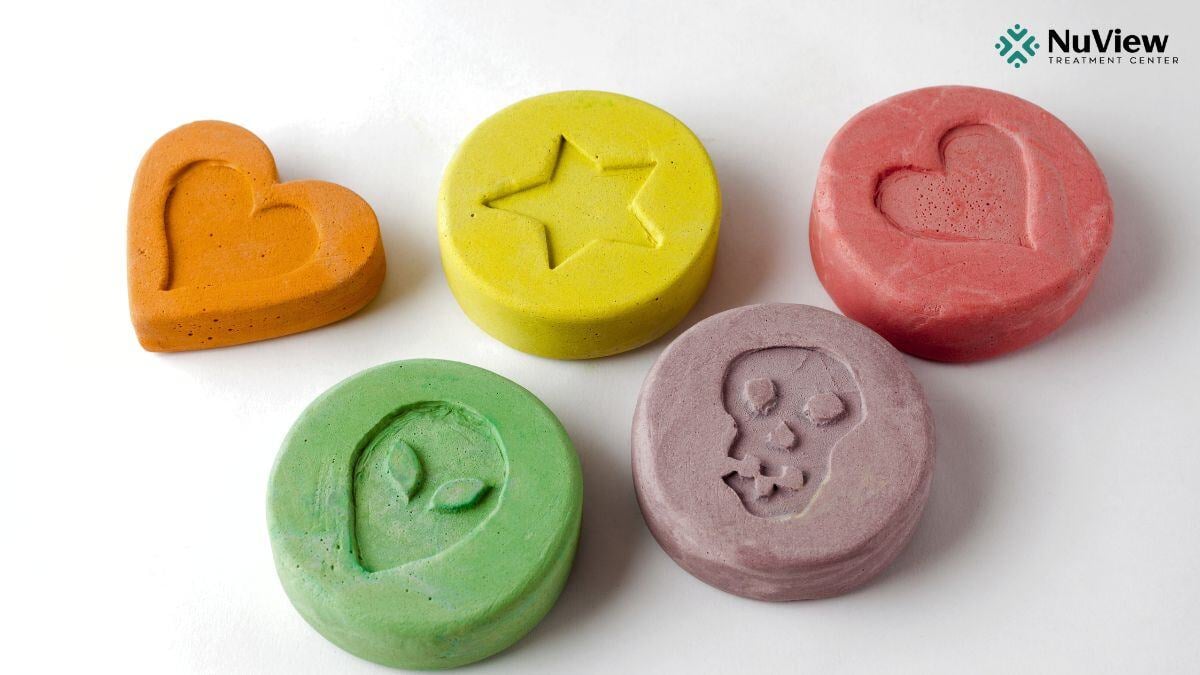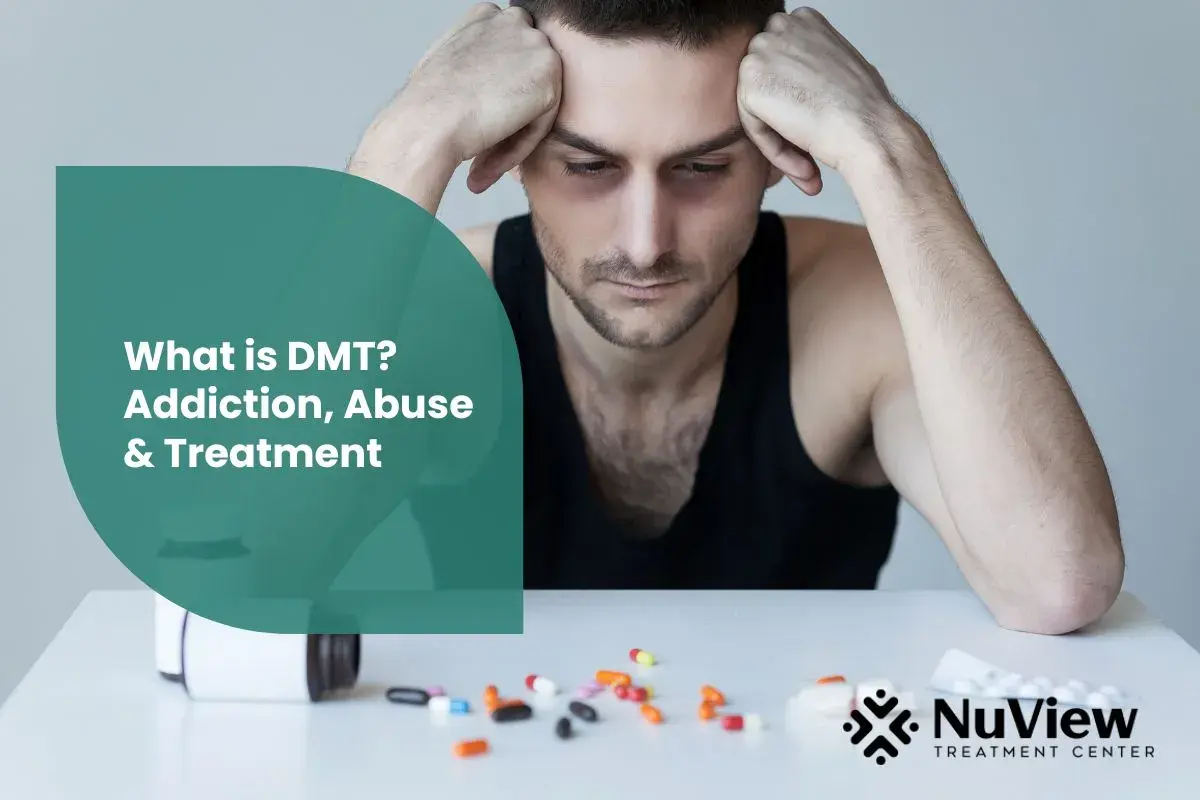Ecstasy goes by the name of MDMA. MDMA stands for 3,4-methylenedioxymethamphetamine. It also goes by the name of Molly. A synthetic drug, it is known for being a stimulant and hallucinogen. Hence, it is commonly used in nightclubs and rave parties. Globally, nearly 1.2% of people use ecstasy.
With ecstasy, it is not really known whether it does lead to addiction. However, 43% of the users did meet the criteria of dependence. At the NuView Treatment Center, we offer tailored treatment plans for those suffering from ecstasy dependence, focusing on recovery, education, and ongoing care for lasting sobriety.
What is Ecstasy (MDMA)?
Ecstasy or MDMA is a synthetic drug. It is created in the lab. It is a hallucinogen and a stimulant. It also goes by the more common street names of Molly, Beans, Biscuit, Disco,, Lover’s Hug, Peace, and so on.
Ecstasy works by affecting the serotonin in the brain, which is a feel-good hormone. It allows one to experience the feelings of euphoria or a rush of pleasurable feelings and alters the perception of reality. It also reduces inhibitions. Regardless of this, ecstasy is labeled as a “Schedule I Substance” under the Controlled Substances Act, which means that it has no known medical benefits and also has a great potential for abuse.
How Is MDMA (Ecstasy) Used?
Ecstasy or MDMA can be swallowed, as it is available as a pill or a tablet. It can also be snorted, as it comes in a powder form as well. It is also consumed as a liquid and inhaled and rarely is injected.
Moreover, ecstasy is rarely used alone in parties. It is often taken with other hallucinogens like LSD and alcohol.
Get Started With Nuview Treatment Center
Our dedicated professional staff is here to guide you or your loved one on the journey to lasting recovery, offering support every step of the way.
How Ecstasy (MDMA) Affects the Brain and Body?
Ecstasy or MDMA can affect the brain and the body in different ways. In the brain, it boosts the levels of serotonin, dopamine, and norepinephrine. Therefore, it gives the feeling of a “rush” – a high or euphoria. However, prolonged use can also affect mood and cognition given its adverse impacts on serotonin and dopamine systems.
In controlled settings, researchers are looking at how MDMA can be used in the treatment of anxiety, depression, and post-traumatic stress disorder. However, the outcomes have still not been very convincing. For instance, while MDMA did help in reducing the symptoms of post-traumatic disorder, side effects including suicidal thoughts were also found to take place. Hence, safety was jeopardized with the use of the drug.
Meanwhile, coming to the body, MDMA can affect its ability to moderate temperature. This can lead to dehydration, and in extreme cases, even hypothermia. Moreover, given that it is a stimulant, it can also increase blood pressure and heart rate, which are quite risky for people suffering from cardiovascular problems.
Effects and Side Effects of Ecstacy
Ecstasy is a stimulant, its immediate effects kick in about 45 minutes after consumption. It elevates a person’s energy levels and mood, increases empathy, and reduces inhibitions. As it impacts the serotonin system in the brain, it gives rise to pleasurable feelings also known as a high or euphoria. This is why people generally take ecstasy. Moreover, as a hallucinogen, it distorts the sense of reality.
While it is understandable why ecstasy is a very common nightclub or rave drug, it does have a lot of side effects as well.
Physically, ecstasy can lead to the following side effects:
Muscle tension
Cramps
Increased blood pressure
Increased heart rate
Tremors
Sweating
Blurred vision
Nausea
Fainting
Hyperthermia (a potentially fatal condition)
Psychologically, it can lead to:
Confusion
Low mood
Sleep problems
Anxiety
Cravings
Common Uses of Ecstasy
It has been more than a century now since ecstasy or MDMA was first synthesized in the lab, way back in 1912. It was initially used for psychotherapeutic purposes, however, now it has become clear that ecstasy is not safe for the same.
From the 1970s onward, it became a popular nightclub and rave party drug. The reason being, it makes one feel high or euphoric. It also reduces inhibitions and evokes feelings of intimacy, empathy, and sexuality. This makes it a very popular drug among adolescents and young adults.
While ecstasy has no known medical benefit as of yet, it continues to be a popular party drug and is often mixed with amphetamine and methamphetamine. It has more than 21 million users worldwide.
Get Started With Nuview Treatment Center
Is Ecstasy Addictive?
It is not completely established whether ecstasy is addictive or not, but it has a high potential for physical dependence and abuse. Nearly 43% of ecstasy users show signs of dependence while 34% of ecstasy users even showed signs of abuse.
Ecstasy, while not being evidently addictive, is a dangerous drug. The Centers for Disease Control (CDC) said that nearly 23% of overdose deaths were related to ecstasy and other similar drugs. Psychostimulants, to be more precise.
The Risks and Dangers of Ecstasy Use
There are many risks and dangers related to ecstasy use. In fact, its effects are similar to cocaine. So, risks and dangers involve disorganized thinking patterns, emotional detachment, nausea, hot flashes, decreased appetite, increased blood pressure, increased heart rate, and adverse impacts on the body’s ability to regulate temperature. This leads to dehydration and hyperthermia, which can lead to liver, kidney, and heart failure. This can even lead to death. In fact, 1 in 20,000 deaths are related to ecstasy use.
Signs of Ecstasy Abuse and Addiction
Ecstasy is not an addictive drug, however, the signs of ecstasy abuse are as follows:
Extended energy levels
Dilated pupils
Teeth/jaw clenching
Increased body temperature
Dehydration
Sleep problems
Seizures
Liver and kidney failure
Heart failure
Nerve degeneration
Brain damage
Memory difficulties
Increased risk of a stroke
If anybody is experiencing any of the symptoms, then it is important to contact healthcare or emergency services. For instance, in the US, contacting 9-1-1 will be helpful.
Treatment Options for Ecstasy Use
Treatment options for ecstasy use are available and there is hope for a healthy, fulfilling life ahead. It begins with an ecstasy detox, which is medically supervised. Under safe and controlled conditions, the drug is gradually reduced. This helps in minimizing and controlling withdrawal symptoms.
Ecstasy detox will be followed with an ecstasy rehab. This involves individual psychotherapy, group sessions, and ongoing care and support. Behavioral therapies like Cognitive Behavioral Therapy and holistic therapies like Mindfulness Therapy will help in healing, balance, and healthy coping strategies to help with relapse prevention. Moreover, it will also involve addressing any co-occurring disorders like anxiety, post-traumatic stress disorder, or mood disorders, among others.
- What is Ecstasy (MDMA)?
- How Is MDMA (Ecstasy) Used?
- How Ecstasy (MDMA) Affects the Brain and Body?
- Effects and Side Effects of Ecstacy
- Common Uses of Ecstasy
- Is Ecstasy Addictive?
- The Risks and Dangers of Ecstasy Use
- Signs of Ecstasy Abuse and Addiction
- Treatment Options for Ecstasy Use
- What is Ecstasy (MDMA)?
- How Is MDMA (Ecstasy) Used?
- How Ecstasy (MDMA) Affects the Brain and Body?
- Effects and Side Effects of Ecstacy
- Common Uses of Ecstasy
- Is Ecstasy Addictive?
- The Risks and Dangers of Ecstasy Use
- Signs of Ecstasy Abuse and Addiction
- Treatment Options for Ecstasy Use
Get Help Today!
Everyone is Welcome Here and We All Have Your Back
Your healing journey deserves a personalized approach. At NuView, we integrate expertise in behavioral therapy, mental health, and substance use treatment to create a customized recovery plan tailored to your unique needs.
Connect with our Admissions Specialists today.







Written By
Dr. Ryan Peterson